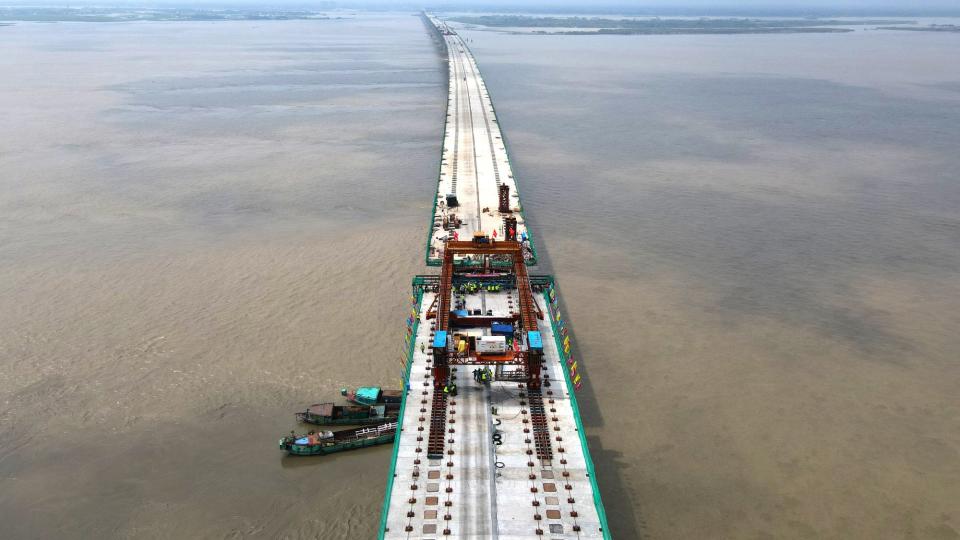China and Bangladesh pledge to fight external interference and boost economic cooperation
China and Bangladesh have pledged to deepen economic cooperation and fight foreign interference.
Chinese President Xi Jinping announced relations with Bangladesh would be upgraded to a comprehensive strategic partnership during the visit of Prime Minister Sheikh Hasina on Wednesday.
State broadcaster CCTV reported that Xi had said "China ... is willing to take the 50th anniversary of the establishment of diplomatic relations next year as an opportunity to deepen high-quality joint construction of the Belt and Road Initiative, expand the breadth and depth of cooperation in various fields".
Do you have questions about the biggest topics and trends from around the world? Get the answers with SCMP Knowledge, our new platform of curated content with explainers, FAQs, analyses and infographics brought to you by our award-winning team.
He said: "The two sides should carry forward the fine tradition of mutual support and deepen political mutual trust. China supports Bangladesh in adhering to an independent foreign policy, following a development path that suits its national conditions ... and opposing any external interference."
Hasina is leading a delegation of political and business leaders on her first visit to the country since 2019.
She thanked China for supporting the country's economic development, saying the country would "actively participate" in the Belt and Road Initiative, and welcomed China's backing for the country's plans to become a developed nation by 2041.
Hasina also reassured Xi over Taiwan - Beijing's most sensitive issue - saying "Bangladesh firmly adheres to the one-China principle, supports China's position on the Taiwan issue, and resolutely opposes external forces interfering in China's internal affairs".
She also met Premier Li Qiang, to witness the signing of more than 20 memorandums of understanding covering areas such as trade, the digital economy and infrastructure. They also announced that a feasibility study into a free-trade agreement had been completed.
On Tuesday she attended an investment summit in Beijing, where a further 16 MoUs were signed, including an agreement to develop digital payments between Bangladeshi financial service company Nagad and Huawei Technologies.
Li said China would always prioritise the development of relations with Bangladesh and would back its firms in "strengthening industrial investment cooperation" and improving the security of supply chains.
"China is willing to strengthen communication and coordination with Bangladesh in multilateral fields, oppose hegemony and power politics, and better safeguard international fairness and justice and the common interests of developing countries," he said, according to CCTV.
Bangladesh's Foreign Minister Hasan Mahmud told the United News of Bangladesh that China has offered US$1 billion in economic assistance. The news agency also reported that Li had backed Bangladeshi participation in the Brics bloc of developing nations.
Bangladesh was the first South Asian nation to sign on the Belt and Road Initiative, Xi's signature infrastructure scheme.
Since 2016 it has helped fund the building of roads, bridges and power projects in Bangladesh and, according to Chinese ambassador Yao Wen, the country had received US$1.4 billion of Chinese investment by the end of last year.

The Padma Multipurpose Bridge Project in Munshiganj is seen under construction on the outskirts of Dhaka, Bangladesh, in September 2021. The construction was being undertaken by China Railway Major Bridge Engineering Group Co, Ltd Photo: Xinhua alt=The Padma Multipurpose Bridge Project in Munshiganj is seen under construction on the outskirts of Dhaka, Bangladesh, in September 2021. The construction was being undertaken by China Railway Major Bridge Engineering Group Co, Ltd Photo: Xinhua>
But the scale of China's loans to the debt-ridden country - which have passed US$5 billion according to the Daily Star newspaper - have raised fears that the country will be caught in a "debt trap" and struggle to repay them.
On Tuesday, Hasina met Jin Liqun, president of the Asia Infrastructure Investment Bank, to ask for the country's interest payments to be reduced.
In addition, before the visit Mahmud had said the country, which is facing a shortage of foreign currency reserves, would seek a further US$5 billion in loans from China.
There has been no immediate response from China to the requests.
China's growing influence in the region has caused concern in India, leaving Bangladesh trying to strike a balance between the two rivals, prompting Hasina to visit the country twice last month.
Separately on Tuesday, she met Wang Huning, the No. 4 in China's political hierarchy, to ask for help in repatriating Rohingya refugees back to Myanmar, according to the Daily Star.
Nearly one million of Rohingyas have been living in Bangladesh since they were forced to flee a violent crackdown in 2017, according to the United Nations Refugee Agency.
Wang told Hasina that China will make the "highest efforts" to resolve the issue, including talks with Myanmar's ruling junta.
This article originally appeared in the South China Morning Post (SCMP), the most authoritative voice reporting on China and Asia for more than a century. For more SCMP stories, please explore the SCMP app or visit the SCMP's Facebook and Twitter pages. Copyright © 2024 South China Morning Post Publishers Ltd. All rights reserved.
Copyright (c) 2024. South China Morning Post Publishers Ltd. All rights reserved.

 Yahoo Finance
Yahoo Finance 